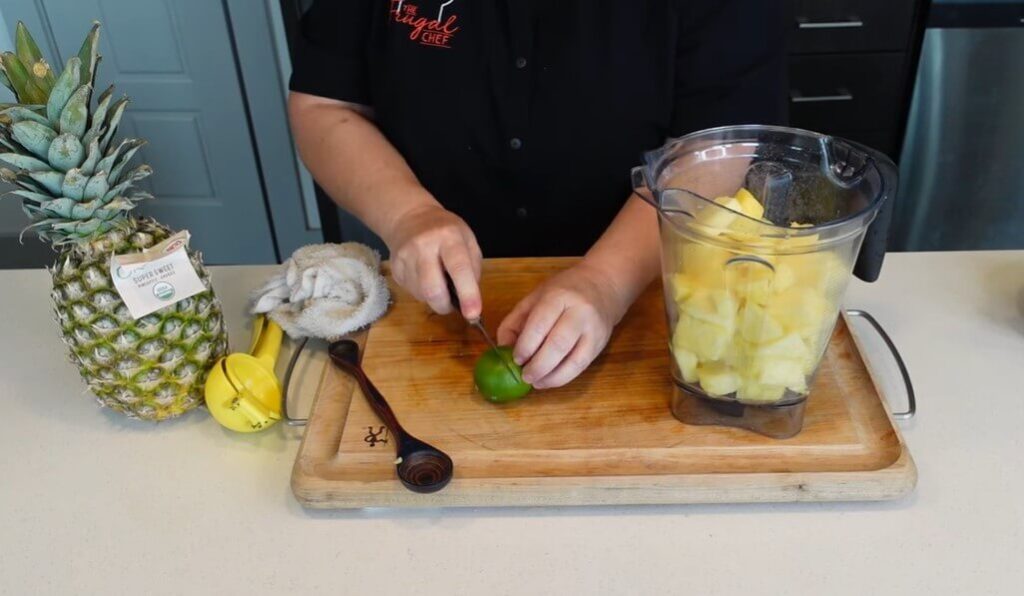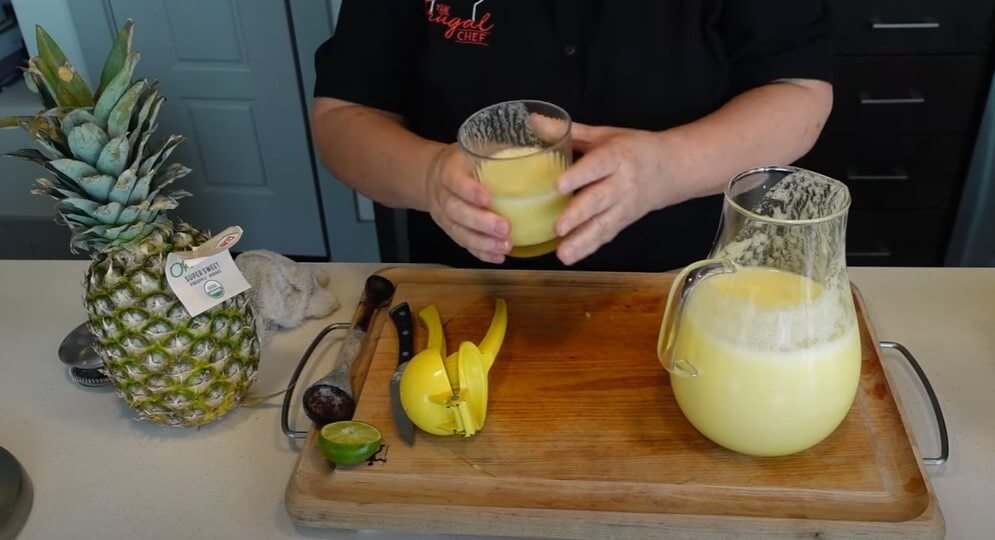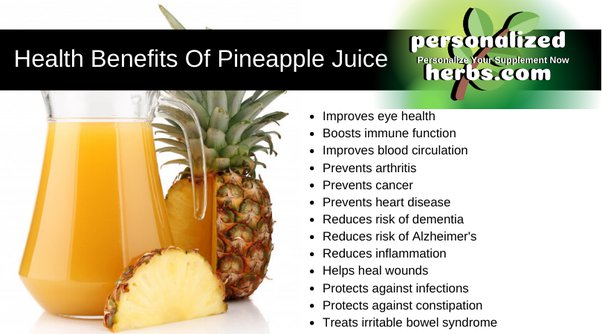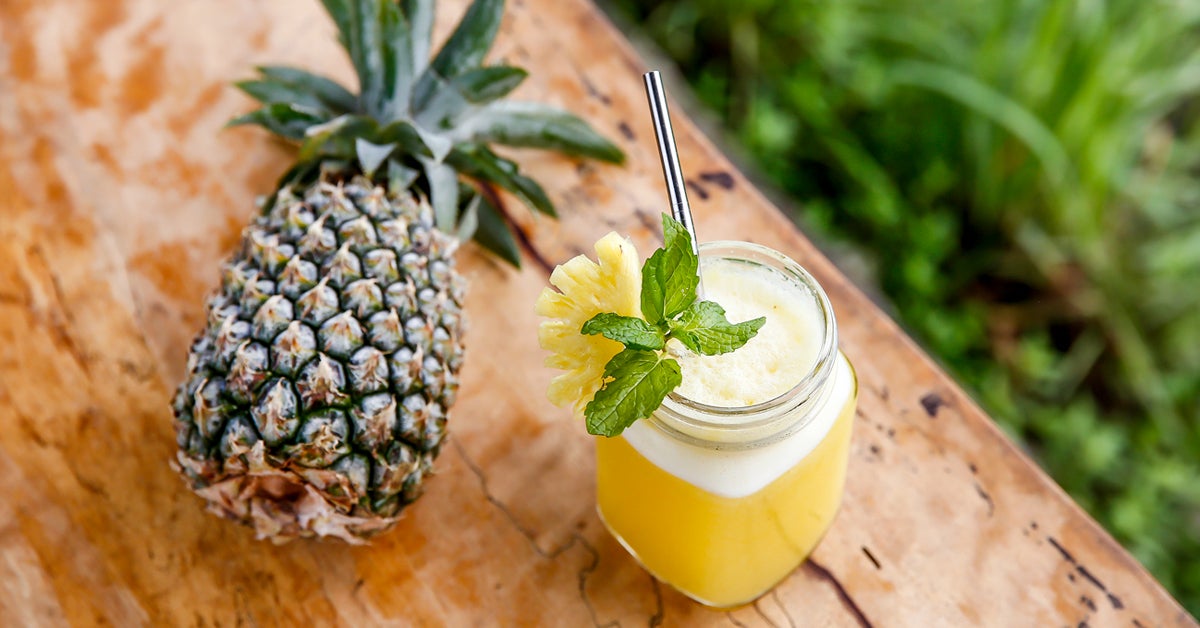Pineapple juice has been shown to reduce swelling due to its anti-inflammatory properties. Pineapple juice is known to be one of the most effective natural anti-inflammatory drinks with health benefits right from aiding digestion to reducing inflammation.
Bromelain, a group of digestive enzymes found in pineapples is the key component that makes pineapple juice successful in treating swelling, arthritis, joint pain and other inflammatory conditions. Regular consumption of pineapple juice could help reduce the risk of chronic diseases associated with inflammation, such as heart disease, diabetes and certain types of cancer.
Pineapple juice is a great refreshing drink to have on a hot summer day while reaping its anti-inflammatory benefits at the same time.

The Healing Powers Of Pineapple Juice
Pineapple juice is a delicious beverage enjoyed around the world for its unique taste and remarkable health benefits. This tropical fruit is not only low in calories but also a rich source of essential vitamins, minerals, and dietary fibers. However, its most significant potential for certain health conditions lies in its natural anti-inflammatory properties.
The Nutritional Value Of Pineapple Juice
Pineapple juice is not just any ordinary fruit juice. It is loaded with nutrients that can help keep your body fit and healthy. Here are some of the key nutrients you can find in pineapples and pineapple juice:
- Vitamin c: An essential nutrient that supports the immune system and helps the body absorb iron more efficiently.
- Manganese: A mineral crucial for maintaining bone density, regulating blood sugar levels, and aiding in the production of collagen in the body.
- Bromelain: A group of enzymes that can help break down proteins and reduce inflammation in the body.
- Potassium: A mineral responsible for regulating blood pressure and supporting nerve and muscle function.
- Dietary fibers: A type of carbohydrate that supports digestion and helps lower cholesterol levels.
Pineapple Bromelain And Its Anti-Inflammatory Properties
Bromelain is the most well-known active ingredient in pineapples and pineapple juice. It has potent anti-inflammatory properties that can help reduce swelling and inflammation caused by numerous health conditions.
Here are some of the health benefits people can gain from drinking pineapple juice, specifically those related to inflammation:
- Reduction of joint pain and arthritis
- Relief from digestive problems and bloating
- Faster recovery from sports injuries
- Reduced frequency and severity of respiratory infections
- Reduced risk of certain types of cancer
- Improved healing after surgeries
Benefits Of Pineapple Juice For Inflammation And Swelling
When it comes to reducing inflammation and swelling, pineapple juice may be a helpful addition to your diet. Some of the benefits that pineapple juice may offer in this area include:
- A natural, anti-inflammatory alternative to over-the-counter medication
- A safe and effective way to support improved digestive health
- A natural option for supporting a healthy immune system
- A gentle way to speed up recovery from minor injuries or swelling caused by surgeries
Incorporating pineapple juice into your daily routine might offer a number of health benefits. From supporting overall wellness to helping reduce inflammation and swelling, the healing powers of this tropical fruit are undeniable. Plus, its sweet, refreshing flavor makes it a tasty addition to any diet.
How To Make Pineapple Juice?
Pineapple juice is famous for its numerous health benefits, which include reducing inflammation and swelling. Pineapple contains an enzyme called bromelain, which has anti-inflammatory properties. This enzyme breaks down proteins, reducing inflammation and swelling in the body.
Here, we’ll show the easy process of how to make pineapple juice and how it can be useful in reducing swelling.

Essential Equipment For Making Pineapple Juice
Before we start with the recipe, let’s discuss the essential equipment you’ll need to make fresh pineapple juice.
- A sharp knife to cut the pineapple
- A sturdy cutting board to chop the pineapple
- A blender or a juicer to extract the juice.
It’s recommended to use a blender over a juicer to retain all the fiber and nutrients from the pineapple.
Step-By-Step Guide To Making Pineapple Juice
Making pineapple juice at home is super easy. Follow these simple steps to make fresh pineapple juice:
- Select a ripe pineapple, which is heavy, firm, and fragrant.
- Cut off the crown and base of the pineapple using a sharp knife.
- Slice the skin off the pineapple and remove any eyes or brown spots with the tip of the knife.
- Cut the pineapple into small pieces, ensuring the hard center is removed.
- Place the pineapple pieces in a blender and blend until smooth.
- Strain the juice through a fine-mesh strainer or cheesecloth to remove any pulp.
- Serve it over ice and enjoy!
Tips For Preserving Nutrients While Making Pineapple Juice
Fresh pineapple juice contains all the essential vitamins, minerals, and enzymes that are beneficial for reducing swelling. Here are some tips to preserve the nutrients while making pineapple juice:
- Use a sharp knife to cut the pineapple, and avoid damaging the pulp.
- Choose a ripe pineapple to get the maximum amount of nutrients.
- Blend the pineapple at a slow speed to avoid destroying the enzymes.
- Don’t add any sugar or artificial sweeteners as pineapple juice is naturally sweet.
- Drink the juice immediately to get the maximum nutritional benefits.
Pineapple juice is a refreshing and delicious way to reduce swelling and inflammation in the body. By following the above steps, you can prepare fresh and nutritious pineapple juice at home easily. So, what are you waiting for? Try making pineapple juice at home today and enjoy its health benefits.
Best Ways To Incorporate Pineapple Juice Into Your Diet
Does pineapple juice reduce swelling – best ways to incorporate pineapple juice into your diet
Pineapple juice is a tasty and natural way to reduce inflammation and swelling, thanks to bromelain, an enzyme found in pineapples that has anti-inflammatory properties. Incorporating pineapple juice into your diet is an easy and delicious way to reduce inflammation and improve your overall health.
Pineapple Juice As A Refreshing Drink
Pineapple juice is a refreshing beverage that can be enjoyed any time of the day. Here are some simple ways to enjoy this juice as a drink:
- Drink it chilled with ice cubes to cool down on a hot summer day.
- Add sparkling water for a fizzy and refreshing twist.
- Mix with other fruit juices for a tropical blend.
Pineapple Juice Smoothies For Quick And Healthy Meals
Smoothies are an excellent way to integrate pineapple juice into your diet. Here are some of the quick and healthy pineapple juice smoothies to try:
- Pineapple and banana smoothie: Blend one cup of pineapple chunks, one banana, one cup of coconut milk, and ice cubes for a smooth and creamy drink.
- Tropical green smoothie: Blend one cup of pineapple chunks, one cup of spinach, one cup of coconut milk, one banana, and ice cubes for a super healthy and delicious drink.
- Carrot and pineapple smoothie: Blend one cup of pineapple chunks, one carrot, one cup of coconut milk, and ice cubes for a refreshing and nutritious drink.

Pineapple Juice Salad Dressing For A Healthy Twist
Pineapple juice dressing adds a healthy twist to your salad, and it’s straightforward to make. Here are some ideas:
- Pineapple vinaigrette: In a small bowl, whisk together 1/3 cup pineapple juice, 1/3 cup of olive oil, 1 tablespoon of honey, and 1 tablespoon of dijon mustard. Drizzle over the salad and toss.
- Sweet and sour dressing: In a small bowl, whisk together 1/4 cup pineapple juice, 1 tablespoon of honey, 2 tablespoons of rice vinegar, 1 tablespoon of soy sauce, and 1 tablespoon of sesame oil. Drizzle over the salad and toss.
Incorporating pineapple juice into your diet is an easy and delicious way to reap the benefits of bromelain for reducing inflammation and improving overall health. With these simple ideas, you can add pineapple juice to your meal plans and enjoy the sweet and tangy flavor of this tropical fruit.
Precautions When Using Pineapple Juice For Swollen Joints
Swollen joints can be a result of a variety of factors, including injuries, arthritis, or inflammation. Pineapple juice is believed to have beneficial properties that can help reduce swelling due to the presence of an enzyme called bromelain.
However, before trying pineapple juice as a remedy for swollen joints, it is essential to understand how to use it safely and effectively.
Pineapple Juice Dosage Guideline
When using pineapple juice as a remedy for swelling, it is essential to know the correct dosage to prevent any adverse effects. Here are the recommended pineapple juice dosage guidelines:
- Drink a maximum of 1 cup of pineapple juice per day.
- Start with a small quantity of pineapple juice and gradually increase the dosage.
- Ensure that the pineapple juice you consume is fresh and does not contain any additives or sweeteners.
- Consult with a doctor or nutritionist before starting to use pineapple juice as a remedy for swelling.
Pineapple Juice Side Effects And Precautions
While pineapple juice can have health benefits, it is essential to consider potential side effects and precautions before using it to treat swelling. Here are some things to keep in mind:
- Pineapple juice can cause digestive issues such as diarrhea and stomach aches.
- Drinking too much pineapple juice can lead to a buildup of bromelain in the body, which can cause skin rashes, vomiting, and allergic reactions.
- People with allergies to pineapple should avoid using pineapple juice as a remedy for swelling.
- Pregnant or breastfeeding women should avoid consuming large amounts of pineapple juice.
A Word Of Caution For Patients On Medications
If you are on medication, it is crucial to consult with a healthcare provider before using pineapple juice to treat swelling. Bromelain, the active ingredient in pineapple juice, can interact with certain medications, including blood thinners and antibiotics. Pineapple juice can also affect the absorption of some medications, reducing their effectiveness.
Pineapple juice can be a beneficial remedy for reducing swelling, thanks to its powerful anti-inflammatory properties. However, it is crucial to follow proper dosage guidelines and take precautions to avoid any adverse effects. If you have any concerns about using pineapple juice as a remedy for swelling, it is best to consult with a healthcare provider.
How much pineapple to reduce swelling?
Pineapple contains an enzyme called bromelain that has anti-inflammatory properties and may help reduce swelling. However, there is no one-size-fits-all answer to the question of how much pineapple to eat to reduce swelling. The amount of bromelain in pineapple can vary depending on the variety of pineapple, how ripe it is, and how it is processed. Additionally, people may respond differently to bromelain.
Some studies have suggested that taking bromelain supplements may help reduce swelling after surgery. However, more research is needed to confirm these findings. If you are considering using pineapple or bromelain supplements to reduce swelling, talk to your doctor first.

Does pineapple juice help with swelling after surgery?
Absolutely! Pineapple juice contains bromelain, an enzyme known for its potential anti-inflammatory properties. Some studies suggest that bromelain may help reduce swelling, making pineapple juice a refreshing and potentially beneficial choice after surgery.
However, it’s essential to consult with your healthcare provider for personalized advice tailored to your specific situation.
Does pineapple juice help with wisdom teeth?
Indeed, pineapple juice can be a wise choice when dealing with wisdom teeth. The bromelain in pineapple has anti-inflammatory properties that might assist in reducing swelling and easing discomfort associated with wisdom teeth issues. Enjoying some pineapple juice could offer a refreshing and potentially soothing option.
As always, though, for personalized advice tailored to your situation, it’s best to consult with your healthcare professional.
Is pineapple juice good for reducing inflammation?
Yes, pineapple juice is a good source of bromelain, an enzyme with anti-inflammatory properties. Bromelain has been shown to reduce inflammation in various studies, including those on osteoarthritis, rheumatoid arthritis, and acute inflammation.
Here’s how bromelain works:
- Reduces inflammatory enzymes: Bromelain inhibits the production of prostaglandins and leukotrienes, which are molecules that play a role in inflammation.
- Proteolytic activity: Bromelain breaks down fibrin, a protein involved in blood clotting and inflammation. This can help reduce swelling and pain.
- Antioxidant properties: Bromelain scavenges free radicals, which are molecules that can contribute to inflammation.
Studies on the effectiveness of pineapple juice for inflammation have shown promising results:
- Osteoarthritis: A study found that bromelain supplements reduced pain and stiffness in people with osteoarthritis of the knee.
- Rheumatoid arthritis: A study found that bromelain supplements improved joint function and reduced pain in people with rheumatoid arthritis.
- Acute inflammation: A study found that bromelain reduced inflammation and pain after dental surgery.
While pineapple juice is generally safe for most people, it’s important to note that it can interact with certain medications, such as blood thinners. It’s always best to consult with your doctor before consuming large amounts of pineapple juice or taking bromelain supplements.
FAQs: Does Pineapple Juice Reduce Swelling?
Does Pineapple Juice Have Anti-Inflammatory Properties?
Yes, pineapple juice contains bromelain, which is a natural enzyme that can reduce inflammation.
Can Pineapple Juice Reduce Swelling?
Yes, pineapple juice with its anti-inflammatory properties can help in reducing swelling, especially in osteoarthritis patients.
What Are The Benefits Of Drinking Pineapple Juice?
Drinking pineapple juice can boost immunity, improve digestion, and reduce inflammation, among other benefits.
How Much Pineapple Juice Should I Drink For A Therapeutic Effect?
A therapeutic dosage of bromelain is 500 mg to 2000 mg per day, which equates to about 3-10 cups of pineapple juice per day. Consult your doctor before consuming such high amounts of pineapple juice.
Conclusion
After examining the available evidence, it appears that pineapple juice may indeed help to reduce swelling. This is likely due to the high levels of bromelain contained within the fruit, which has been shown to have anti-inflammatory properties. While the studies in this area are limited, the potential benefits of drinking pineapple juice as a natural remedy for swelling cannot be ignored.
Of course, it’s important to keep in mind that pineapple juice should not be seen as a replacement for medical treatment if you are experiencing chronic or severe swelling. As with any health concern, it’s always best to consult with a healthcare professional before attempting to self-treat.
However, incorporating a glass of fresh pineapple juice into your daily routine could be a simple and tasty way to support overall health and wellness.

